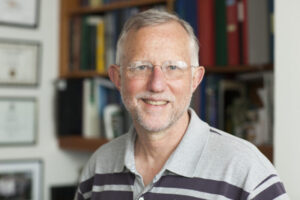
The 2020 Nobel Prize in Physiology or Medicine was awarded Monday, Oct. 5, to three scientists for groundbreaking research that led to the discovery of the hepatitis C virus, an insidious and deadly blood-borne virus. One of those scientists - virologist Charles M. Rice - conducted his seminal work while on the faculty of Washington University School of Medicine in St. Louis from 1986 to 2001. Rice, now at Rockefeller University in New York City, was awarded the prize along with Harvey J. Alter, MD, of the National Institutes of Health (NIH) and Michael Houghton, of the University of Alberta in Canada.
In announcing the prize, the Nobel Assembly said the hepatitis C discovery had "made possible blood tests and new medicines that have saved millions of lives."
Rice remains an adjunct professor in the Department of Molecular Microbiology at the School of Medicine.
An estimated 71 million people have chronic hepatitis C virus infection, according to the World Health Organization. A significant number of those who are chronically infected will develop liver cancer or cirrhosis, scarring of the liver caused by long-term liver damage.
"Charlie is an absolutely brilliant scientist and a wonderful human being who has made a deep impression on all those who have worked with him," said David H. Perlmutter, MD, executive vice chancellor for medical affairs and the George and Carol Bauer Dean of Washington University School of Medicine. "His work on hepatitis C has improved the lives of so many people, and he represents the best of what Washington University stands for."
Before the discovery of the hepatitis C virus, physicians and researchers were concerned by unexplained cases of chronic hepatitis that developed years or decades after blood transfusions. Other forms of hepatitis had been ruled out as the cause. Hepatitis A does not spread through the blood, and while hepatitis B does, a blood test and vaccine had been developed to prevent such cases. Still, the majority of blood-borne hepatitis remained unexplained.
According to the Nobel Assembly, Alter's methodical studies demonstrated that an unknown virus was a common cause of chronic hepatitis, and Houghton used an untested strategy to isolate the genome of the new virus, which was named hepatitis C virus. Rice's critical studies provided the final evidence showing that hepatitis C virus alone could cause the unexplained cases of hepatitis following blood transfusions.
The Nobel Laureates' discovery of hepatitis C virus is a landmark achievement in the ongoing battle against viral diseases, the Nobel Assembly said in a statement. "Thanks to their discovery, highly sensitive blood tests for the virus are now available, and these have essentially eliminated post-transfusion hepatitis in many parts of the world, greatly improving global health. Their discovery also allowed the rapid development of antiviral drugs directed at hepatitis C. For the first time in history, the disease can now be cured, raising hopes of eradicating hepatitis C virus from the world population. To achieve this goal, international efforts facilitating blood testing and making antiviral drugs available across the globe will be required."
Rice is the 19th scientist associated with Washington University School of Medicine to be honored with the Nobel Prize.
"Charlie Rice is an amazing person, a spectacular scientist, and a wonderful colleague," said Scott J. Hultgren, the Helen L. Stoever Professor of Molecular Microbiology. "He did work that led to the Nobel Prize here in the Department of Molecular Microbiology, creating the first infectious viral genome for in vitro replication. He was a phenomenal leader and colleague here at Washington University."
Added Washington University collaborator Michael S. Diamond: "Dr. Rice for many decades has been a pioneer in the field of molecular biology and genetics of many emerging RNA viruses including flaviviruses, alphaviruses, and hepaciviruses," said Diamond, MD, PhD, the Herbert S. Gasser Professor of Medicine. "His seminal studies on hepatitis C virus directly led to the screening and identification of direct-acting antiviral drugs that have resulted in a cure for so many people around the world. His creative research on cellular host defense responses to viruses have triggered the development of new classes of host-directed antiviral agents. Moreover, he has mentored and trained a generation of virologists who are now at the vanguard of the field. This is truly a deserving honor for a visionary scientist."
Born in Sacramento, Calif., in 1952, Rice received his PhD in biochemistry in 1981 from the California Institute of Technology, where he was a postdoctoral research fellow from 1981 to 1985. After his 14 years at the School of Medicine, Rice moved to Rockefeller, where he now is the scientific and executive director of the Center for the Study of Hepatitis C, an interdisciplinary center established jointly by The Rockefeller University, NewYork-Presbyterian Hospital, and Weill Cornell Medicine.
He is a member of the National Academy of Sciences, and a fellow of the American Association for the Advancement of Science. His previous awards include the 2007 M.W. Beijerinck Virology Prize, the 2015 Robert Koch Award, the 2016 InBev-Baillet Latour Health Prize, and the 2016 Lasker-DeBakey Clinical Medical Research Award.






